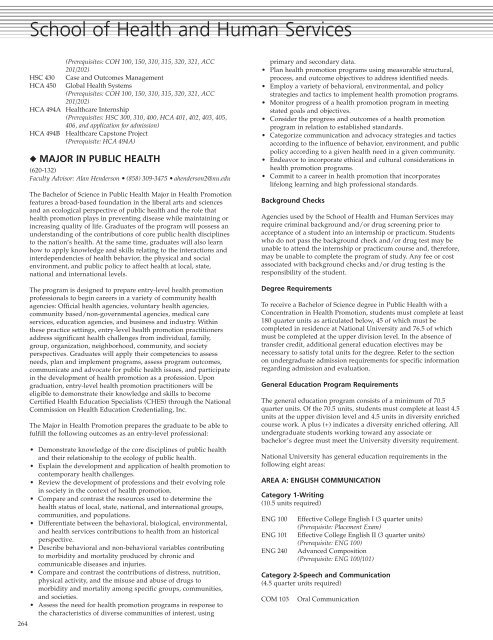Catalog 73 - National University
Catalog 73 - National University
Catalog 73 - National University
- No tags were found...
You also want an ePaper? Increase the reach of your titles
YUMPU automatically turns print PDFs into web optimized ePapers that Google loves.
School of Health and Human Services(Prerequisites: COH 100, 150, 310, 315, 320, 321, ACC201/202)HSC 430 Case and Outcomes ManagementHCA 450 Global Health Systems(Prerequisites: COH 100, 150, 310, 315, 320, 321, ACC201/202)HCA 494A Healthcare Internship(Prerequisites: HSC 300, 310, 400, HCA 401, 402, 403, 405,406, and application for admission)HCA 494B Healthcare Capstone Project(Prerequisite: HCA 494A)◆ MAJOR IN PUBLIC HEALTH(620-132)Faculty Advisor: Alan Henderson • (858) 309-3475 • ahenderson2@nu.eduThe Bachelor of Science in Public Health Major in Health Promotionfeatures a broad-based foundation in the liberal arts and sciencesand an ecological perspective of public health and the role thathealth promotion plays in preventing disease while maintaining orincreasing quality of life. Graduates of the program will possess anunderstanding of the contributions of core public health disciplinesto the nation’s health. At the same time, graduates will also learnhow to apply knowledge and skills relating to the interactions andinterdependencies of health behavior, the physical and socialenvironment, and public policy to affect health at local, state,national and international levels.The program is designed to prepare entry-level health promotionprofessionals to begin careers in a variety of community healthagencies: Official health agencies, voluntary health agencies,community based/non-governmental agencies, medical careservices, education agencies, and business and industry. Withinthese practice settings, entry-level health promotion practitionersaddress significant health challenges from individual, family,group, organization, neighborhood, community, and societyperspectives. Graduates will apply their competencies to assessneeds, plan and implement programs, assess program outcomes,communicate and advocate for public health issues, and participatein the development of health promotion as a profession. Upongraduation, entry-level health promotion practitioners will beeligible to demonstrate their knowledge and skills to becomeCertified Health Education Specialists (CHES) through the <strong>National</strong>Commission on Health Education Credentialing, Inc.The Major in Health Promotion prepares the graduate to be able tofulfill the following outcomes as an entry-level professional:• Demonstrate knowledge of the core disciplines of public healthand their relationship to the ecology of public health.• Explain the development and application of health promotion tocontemporary health challenges.• Review the development of professions and their evolving rolein society in the context of health promotion.• Compare and contrast the resources used to determine thehealth status of local, state, national, and international groups,communities, and populations.• Differentiate between the behavioral, biological, environmental,and health services contributions to health from an historicalperspective.• Describe behavioral and non-behavioral variables contributingto morbidity and mortality produced by chronic andcommunicable diseases and injuries.• Compare and contrast the contributions of distress, nutrition,physical activity, and the misuse and abuse of drugs tomorbidity and mortality among specific groups, communities,and societies.• Assess the need for health promotion programs in response tothe characteristics of diverse communities of interest, using264primary and secondary data.• Plan health promotion programs using measurable structural,process, and outcome objectives to address identified needs.• Employ a variety of behavioral, environmental, and policystrategies and tactics to implement health promotion programs.• Monitor progress of a health promotion program in meetingstated goals and objectives.• Consider the progress and outcomes of a health promotionprogram in relation to established standards.• Categorize communication and advocacy strategies and tacticsaccording to the influence of behavior, environment, and publicpolicy according to a given health need in a given community.• Endeavor to incorporate ethical and cultural considerations inhealth promotion programs.• Commit to a career in health promotion that incorporateslifelong learning and high professional standards.Background ChecksAgencies used by the School of Health and Human Services mayrequire criminal background and/or drug screening prior toacceptance of a student into an internship or practicum. Studentswho do not pass the background check and/or drug test may beunable to attend the internship or practicum course and, therefore,may be unable to complete the program of study. Any fee or costassociated with background checks and/or drug testing is theresponsibility of the student.Degree RequirementsTo receive a Bachelor of Science degree in Public Health with aConcentration in Health Promotion, students must complete at least180 quarter units as articulated below, 45 of which must becompleted in residence at <strong>National</strong> <strong>University</strong> and 76.5 of whichmust be completed at the upper division level. In the absence oftransfer credit, additional general education electives may benecessary to satisfy total units for the degree. Refer to the sectionon undergraduate admission requirements for specific informationregarding admission and evaluation.General Education Program RequirementsThe general education program consists of a minimum of 70.5quarter units. Of the 70.5 units, students must complete at least 4.5units at the upper division level and 4.5 units in diversity enrichedcourse work. A plus (+) indicates a diversity enriched offering. Allundergraduate students working toward any associate orbachelor’s degree must meet the <strong>University</strong> diversity requirement.<strong>National</strong> <strong>University</strong> has general education requirements in thefollowing eight areas:AREA A: ENGLISH COMMUNICATIONCategory 1-Writing(10.5 units required)ENG 100ENG 101ENG 240Effective College English I (3 quarter units)(Prerequisite: Placement Exam)Effective College English II (3 quarter units)(Prerequisite: ENG 100)Advanced Composition(Prerequisite: ENG 100/101)Category 2-Speech and Communication(4.5 quarter units required)COM 103Oral Communication
















